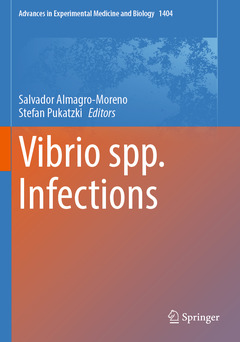Vibrio spp. Infections, 1st ed. 2023 Advances in Experimental Medicine and Biology Series, Vol. 1404
Coordonnateurs : Almagro-Moreno Salvador, Pukatzki Stefan

This book addresses current topics on pathogenic Vibrio spp. from a comprehensive and holistic perspective. Here, experts in the field provide timely chapters, ranging from genomics, pathogen emergence, and epidemiology to pathogenesis, virulence regulation and host colonization. Questions addressed include: How does climate change affect the spread of these bacteria? What is the status of current vaccines? Are there novel therapeutic options to treat Vibrio infections? Is there likelihood of emergence of new pathogenic strains or species? Can insights from mathematical models and epidemiology lead to prediction of pathogen outbreaks?
Recent decades have seen a steady increase in Vibrio spp. infections originating in aquatic and marine habitats, driven by higher human population densities, warming of polluted oceans, natural and human-made disasters, and mass seafood production. These conditions increase the likelihood of pathogenic Vibrio spp. coming into contact with humans, making their study even more timely and relevant as these problems escalate over time.This book is a valuable resource for health management professionals, experienced microbiologists/ microbial ecologists, and early career scientists alike who want to learn more about these important environmental human pathogens. The ideas and technologies presented in this book for preventing, controlling, and monitoring Vibrio spp. infections contribute to the UN Sustainable Development Goal 3: Good Health and Well-Being.
Chapter 1. Vibrio Infections and the Twenty-First Century.- Chapter 2. New Insights into Vibrio Cholerae Biofilms from Molecular Biophysics to Microbial Ecology.- Chapter 3. Type VI Secretion Systems: Environmental and Intra-Host Competition of Vibrio cholerae.- Chapter 4. Motility Control as a Possible Link Between Quorum Sensing to Surface Attachment in Vibrio Species.- Chapter 5. The Vibrio Polar Flagellum: Structure and Regulation.- Chapter 6. Environmental Reservoirs of Pathogenic Vibrio Spp. and Their Role in Disease: The List Keeps Expanding.- Chapter 7. Cholera Dynamics and the Emergence of Pandemic Vibrio cholerae.- Chapter 8. Role of Bacteriophages in the Evolution of Pathogenic Vibrios and Lessons for Phage Therapy.- Chapter 9. Vibrio vulnificus, an Underestimated Zoonotic Pathogen.- Chapter 10. The Role of Nutrients and Nutritional Signals in the Pathogenesis of Vibrio cholerae.- Chapter 11. Stress Responses in Pathogenic Vibriosand Their Role in Host and Environmental Survival.- Chapter 12. Vibrio parahaemolyticus Epidemiology and Pathogenesis: Novel Insights on an Emerging Foodborne Pathogen.- Chapter 13. The Viable but Non-Culturable (VBNC) State in Vibrio Species: Why Studying the VBNC State Now, Is More Exciting than Ever.- Chapter 14. Structural Insights into Regulation of Vibrio Virulence Gene Networks.- Chapter 15. When Vibrios Take Flight: A Meta-Analysis of Pathogenic Vibrio Species in Wild and Domestic Birds.- Chapter 16. What Whole Genome Sequencing Has Told Us About Pathogenic Vibrios.
Salvador Almagro-Moreno is an Assistant Professor of Medicine at the University of Central Florida. He was the E.E. Just Postdoctoral Fellow at Dartmouth College in Dr. Ronald Taylor’s lab where he studied molecular pathogenesis and emergence of pathogenic Vibrios. His research interests include elucidating the molecular adaptations developed by bacteria in order to colonize the human host and how environmental factors affect their pathogenic potential. His research program focuses on two model systems as distinct paradigms of pathogen emergence: Vibrio cholerae, the etiological agent of the severe diarrheal disease cholera, and Vibrio vulnificus, an emergent pathogen that causes a deadly septicemia. His research approach strives to be holistic and multidisciplinary: “From Bays to Bases”. It encompasses a mix of molecular biology, genomics, phylogenetics, pathogenesis, and ecology.
Stefan U. Pukatzki is the Sharon D. Cosloy Professor of Biology at The City College of New York. He did his Postdoctoral studies at Harvard University in the laboratory of Dr. John Mekalanos where he co-discovered the Type VI secretion system in bacteria using Vibrio cholerae as a model system. His laboratory explores why a minority of bacteria evolved mechanisms to harm the human host. This behavior is not common, because symbiotic strategies to co-exist with the host are abundantly available. His research on host-pathogen interactions allows us to observe an “arms race” of attack over evolutionary time, which generates concepts and approaches that can be applied to develop alternative therapies to treat antibiotic-resistant bacteria.
Date de parution : 02-2024
Ouvrage de 352 p.
17.8x25.4 cm
Date de parution : 02-2023
Ouvrage de 352 p.
17.8x25.4 cm



